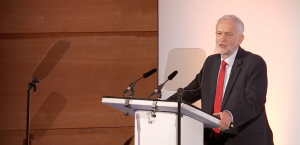Corbyn calls for ‘British Digital Corporation’ to take on tech giants
 UK Labour Party leader Jeremy Corbyn has used his Alternative McTaggart Lecture at the Edinburgh International Television Festival to endorse the idea of creating a publicly owned British Digital Corporation (BDC) – a sister organisation to the BBC that could take on Netflix and Amazon by delivering entertainment and information to the public.
UK Labour Party leader Jeremy Corbyn has used his Alternative McTaggart Lecture at the Edinburgh International Television Festival to endorse the idea of creating a publicly owned British Digital Corporation (BDC) – a sister organisation to the BBC that could take on Netflix and Amazon by delivering entertainment and information to the public.
“A BDC could use all of our best minds, the latest technology and our existing public assets not only to deliver information and entertainment to rival Netflix and Amazon but also to harness data for the public good,” said Corbyn.
“A BDC could develop new technology for online decision making and audience-led commissioning of programmes and even a public social media platform with real privacy and public control over the data that is making Facebook and others so rich.”
Corbyn said the organisation, the idea of which was initially floated by James Harding, the former BBC director of home news at the Hugh Cudlipp lecture earlier this year, could become the access point for public knowledge, information and content currently held in the BBC archives, the British Library and the British Museum.
“Imagine an expanded iPlayer giving universal access to licence fee payers for a product that could rival Netflix and Amazon. It would probably sell pretty well overseas as well,” he said.
In his lecture, Corbyn also called for a freeing up of the BBC from government control by having some executive BBC Board members by staff and non-executive directors by licence fee payers.
“To help decentralise the BBC, national and regional boards could also be expanded, with elections by BBC staff and local licence fee payers. All boards should be representative of the country, with a minimum representation for women and minority groups,” Corbyn said.
The Labour leader said that empowering BBC staff would make the corporation’s top management more accountable.
Corbyn also called for devolution of programme making to regional and national level within the UK with the help of new regional boards.
Speaking about media more broadly and about the need to support journalism in the public interest in particular, he also called for a one-off tax to be levied on global technology giants to fund public service media and journalism if a future government could not negotiate a longer-term funding arrangement for media with the web companies.
“One solution to funding public interest media could be by tapping up the digital monopolies that profit from every search, share and like we make,” he said.
“A strong, self-confident government could negotiate with these tech giants to create a fund, run entirely independently, to support public interest media. Google and news publishers in France and Belgium were able to agree a settlement. If we can’t do something similar here, but on a more ambitious scale, we’ll need to look at the option of a windfall tax on the digital monopolies to create a public interest media fund.”



